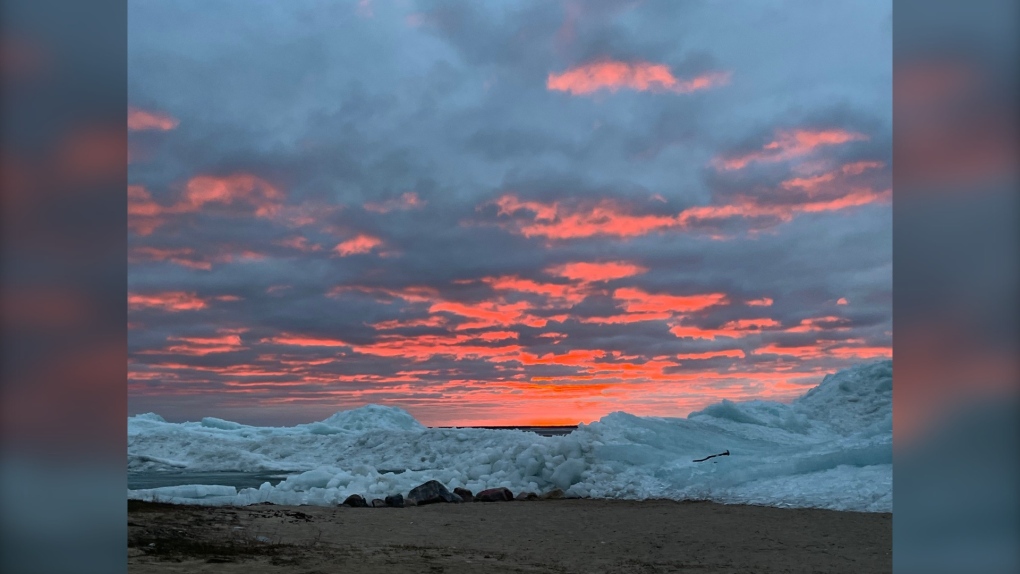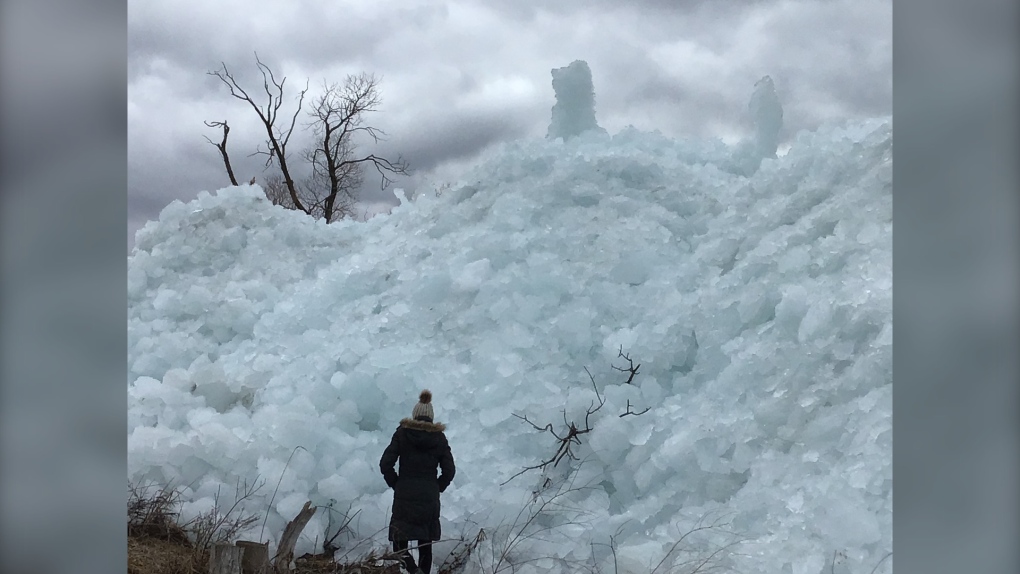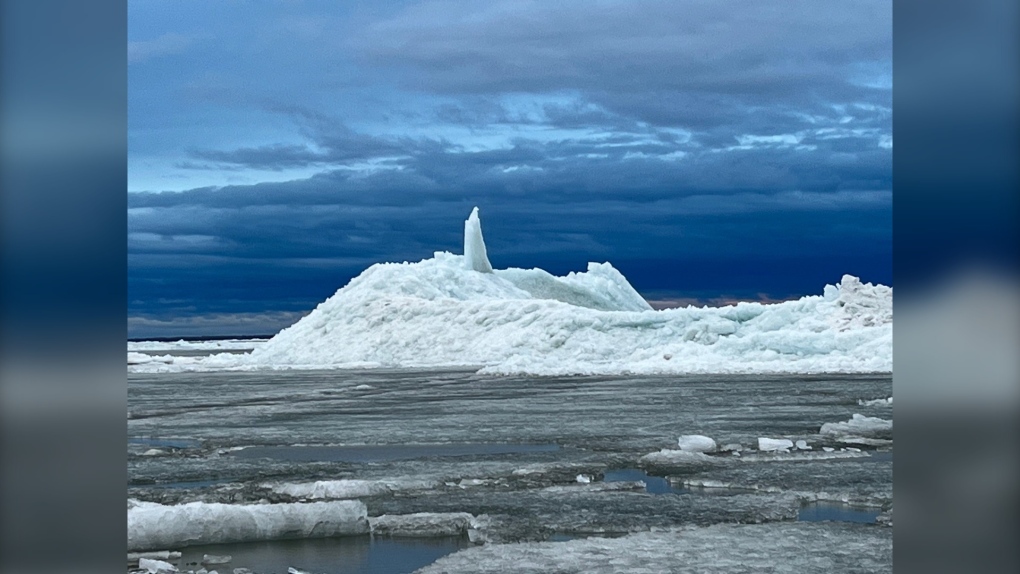'A pretty amazing phenomenon': Giant ice shoves form on Lake Winnipeg
Even though it is spring, some Manitobans were in for a cool surprise over the weekend as ice piled up on the shore of Lake Winnipeg, creating what looked like giant hills of ice.
Ron Suzuki, who lives in Winnipeg Beach, said he drove out to Riverton, Man., on Friday evening and saw the ice piled up about 25 feet high.
 Ice shoves on the shore of Lake Winnipeg. (Source Ron Suzuki)
Ice shoves on the shore of Lake Winnipeg. (Source Ron Suzuki)
“It was all along this one spit, it’s called Sandy Bar Beach…the ice was pushed up against that whole area,” he said in an interview on Tuesday. “It even pushed sand and dirt up to it as well.”
As for what caused the ice pile up, Alex Crawford, a research associate and sessional instructor at the U of M’s Centre for Earth Observation Science, said this is a classic “ice shove.”
Crawford explained that ice shoves most commonly occur in the spring and involve a mobile ice cover and a persistent wind.
 An ice shove on Lake Winnipeg. (Source: Kirby and Celina Russell)
An ice shove on Lake Winnipeg. (Source: Kirby and Celina Russell)
“For the ice cover to be mobile, it needs to be floating on the water. If it's too thick, it might grind on the lake bed and not move easily,” he said in a statement.
Crawford added that mobile ice packs are more common in the spring melt season, because in the fall the ice grows from the shore, but in the spring the melting typically occurs around the shoreline before the centre of the lake.
To then drive the mobile ice cover onto the shore and create an ice shove, it takes a strong, persistent wind.
“These winds blew all that ice onshore, pushing it up relentlessly into those piles,” Crawford said.
“The wind acted like a conveyor belt at a grocery store with nobody bagging, and the ice floes were like the groceries. If the conveyor belt keeps pushing more groceries to the bagging area, they will start piling up at the end.
Other factors, such as water fluctuations, can also contribute to ice shoves.
Suzuki said that he’s seen ice shoves once before in Winnipeg Beach in April 2010.
“It’s a pretty amazing phenomenon,” he said. “I think it’s pretty unique. You need a really big lake.”
 The ice shove on the shore of Lake Winnipeg. (Source: Ron Suzuki)
The ice shove on the shore of Lake Winnipeg. (Source: Ron Suzuki)
CTVNews.ca Top Stories

Doctors say capital gains tax changes will jeopardize their retirement. Is that true?
The Canadian Medical Association asserts the Liberals' proposed changes to capital gains taxation will put doctors' retirement savings in jeopardy, but some financial experts insist incorporated professionals are not as doomed as they say they are.
Something in the water? Canadian family latest to spot elusive 'Loch Ness Monster'
For centuries, people have wondered what, if anything, might be lurking beneath the surface of Loch Ness in Scotland. When Canadian couple Parry Malm and Shannon Wiseman visited the Scottish highlands earlier this month with their two children, they didn’t expect to become part of the mystery.
Fair in Ontario, flurries in Labrador: Weather systems make for an erratic spring
It's no secret that spring can be a tumultuous time for Canadian weather, and as an unseasonably mild El Nino winter gives way to summer, there's bound to be a few swings in temperature that seem out of the ordinary. From Ontario to the Atlantic, though, this week is about to feel a little erratic.
'It was instant karma': Viral video captures failed theft attempt in Nanaimo, B.C.
Mounties in Nanaimo, B.C., say two late-night revellers are lucky their allegedly drunken antics weren't reported to police after security cameras captured the men trying to steal a heavy sign from a downtown business.
Bank of Canada officials split on when to start cutting interest rates
Members of the Bank of Canada's governing council were split on how long the central bank should wait before it starts cutting interest rates when they met earlier this month.
Quebec nurse had to clean up after husband's death in Montreal hospital
On a night she should have been mourning, a nurse from Quebec's Laurentians region says she was forced to clean up her husband after he died at a hospital in Montreal.
Northern Ont. lawyer who abandoned clients in child protection cases disbarred
A North Bay, Ont., lawyer who abandoned 15 clients – many of them child protection cases – has lost his licence to practise law.
An Ontario senior thought he called Geek Squad for help with his printer. Instead, he got scammed out of $25,000
An Ontario senior’s attempt to get technical help online led him into a spoofing scam where he lost $25,000. Now, he’s sharing his story to warn others.
Cuban government apologizes to Montreal-area family after delivering wrong body
Cuba's foreign affairs minister has apologized to a Montreal-area family after they were sent the wrong body following the death of a loved one.

































